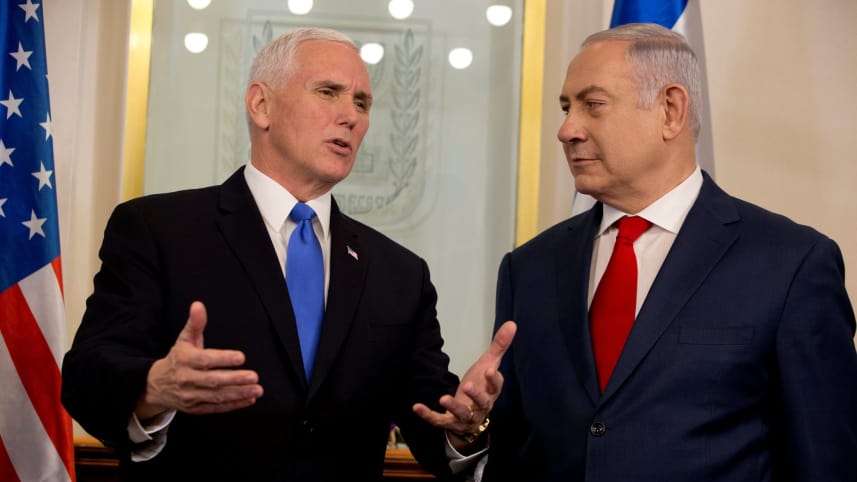Reportage
Pastor Mike Pence delivered a sermon to the Knesset
“Today,” said the U.S. vice president, “as I stand in Abraham’s Promised Land, I believe that all who cherish freedom, and seek a brighter future, should cast their eyes here to this place and marvel at what they behold.”

Was it the Vice President of the United States or an evangelical preacher? It’s hard to tell from listening to the speech, full of biblical quotes, that Mike Pence delivered Monday to the Knesset. Or perhaps he is both one and the other—which is not so strange in the era of Donald Trump, in which international agreements are not worth the paper they’re printed on and religion is used as a blunt instrument.
For an ultra-nationalist and religious government like that of Israeli Prime Minister Benjamin Netanyahu, it was a duty, not to mention a pleasure, to welcome Pence just as warmly as it had welcomed Trump last May, if not even warmer. Pence was one of the main architects of the declaration by which the White House recognized Jerusalem as Israel’s capital on Dec. 6.
“It is fitting that you are the first American vice president to speak at the Knesset in Jerusalem,” Netanyahu said. “Fitting, because no American vice president has had a greater commitment to Israel and its people.” Pence was quick to return the compliment: It is a “great honor” and “privilege” to be “in Jerusalem, the capital of the State of Israel.”
Meanwhile, in Brussels, Palestinian President Mahmoud Abbas was urging the E.U. to recognize the state of Palestine immediately. He only obtained the reassurance that Europe will continue to support the establishment of a Palestinian state, with Jerusalem as the capital of both states. The Europeans told Abbas—although not very enthusiastically—not to reject the U.S. “plan” for the Middle East out of hand without even discussing it.
“This is not the time to disengage, on the contrary,” said Federica Mogherini, High Representative of the Union for Foreign Affairs and Security Policy. “Palestinians, and Israelis, need to show more than ever before their engagement with the international community, with key actors in this process, so that we can together work towards a negotiated outcome.”
Abbas can forget about the idea of the E.U. taking the place of the United States in the eventual negotiations between the Israelis and Palestinians, which would lead them into open conflict with Washington and Tel Aviv. Some of the E.U. member states, however, are expected to recognize the state of Palestine independently: Slovenia is said to be preparing to do so next month, followed by Belgium, Ireland and Luxembourg.
The highlight of Mike Pence’s visit to Jerusalem and Israel was his speech before the Knesset. After the Arab deputies who were protesting and holding up signs saying “Jerusalem capital of Palestine” were kicked out, to the applause of all others, the vice president gave nothing short of a sermon.
“Today,” Pence proclaimed, “as I stand in Abraham’s Promised Land, I believe that all who cherish freedom, and seek a brighter future, should cast their eyes here to this place and marvel at what they behold.”
“It was faith that rebuilt the ruins of Jerusalem and made them strong again,” he went on, after reciting the shehecheyanu, a Hebrew blessing. He was there, he said, to bring “a simple message” from the Americans: that “your cause is our cause, your values are our values.”
“We stand with Israel because we believe in right over wrong, in good over evil, and in liberty over tyranny,” he said, drawing a parallel between the history of the Jews and that of the United States: “It is the story of an exodus, a journey from persecution to freedom,” he added with religious fervor, recalling that the American forefathers, the pilgrims who first arrived in America, “turned to the wisdom of the Hebrew Bible for direction, guidance, and inspiration.”
He boasted that Donald Trump had “righted a 70-year wrong” and announced that the U.S. embassy in Tel Aviv will be moved to the Holy City by 2019. Finally, after urging the Palestinians to come to the negotiating table (under the conditions set by Israel and the United States), Pence had some words against Iran that resembled nothing less than a declaration of war, stressing that Trump will no longer recertify the Iran nuclear deal which was signed, among others, by the U.S. in 2015.
“Pence’s words are simply ridiculous,” Hanan Ashrawi, a member of the Executive Committee of the PLO, told il manifesto. “The United States cannot be talking about the peace process now, after they undermined it by recognizing Jerusalem as the capital of Israel,” he explained. “Pence claims to be speaking according to the will of God. But I will say this to him: God does not want injustice for the Palestinians—we belong to this land, we have inalienable rights here on our land.”
The reaction of the PLO chief negotiator, Saeb Erekat, to Pence’s speech was also swift: “His messianic speech is a gift to the extremists, and proves that the U.S. administration is part of the problem rather than the solution.” Pence visited the Western Wall and the Old City of Jerusalem on Tuesday, and the Palestinians called for a “Day of Rage” and a general strike in the Occupied Territories.
Originally published at https://ilmanifesto.it/sermone-di-mike-pence-alla-knesset-la-bibbia-contro-il-diritto/ on 2018-01-23
